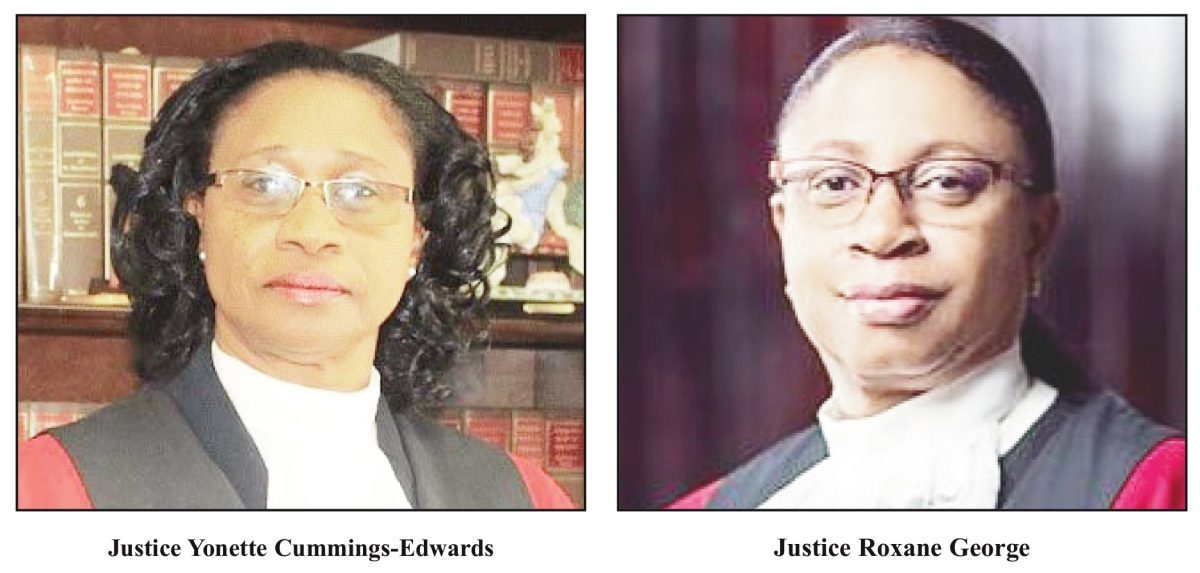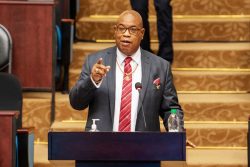Weeks after the Leader of the Opposition signalled his no-objection to the confirmation of Justices Yonette Cummings-Edwards and Roxane George as the substantive Chancellor and Chief Justice, respectively, President Irfaan Ali has yet to make a pronouncement on the matter or initiate the process of dialogue in that regard.
However, Head of the Presidential Press Unit, Suelle Findlay-Williams has related that the President is expected to make a pronouncement “soon”.
Justice Cummings-Edwards and Justice Roxane George SC were respectively appointed acting Chancellor of the Judiciary and Chief Justice back in 2016 and 2017—weeks after the retirement of then acting Chancellor Carl Singh, who was also never confirmed despite having served for 12 years. Guyana has not had a confirmed Chancellor for 17 years.
In a letter dated May 12, 2022, and addressed to Minister of Parliamentary Affairs and Governance Gail Teixeira, Leader of the Opposition Aubrey Norton signalled his intention to agree to confirm the appointment of the two justices.
The letter was written preceding the first meeting between the President and the Opposition Leader to consult on constitutional appointments.
In his letter, Norton stated “…it is disappointing that your [Teixeira’s) letter of the 11th day of May 2022, does not inform of the President’s intention to engage in the consultations required by the constitution in respect of the offices of the Chancellor and Chief Justice of Guyana. The Caribbean Court of Justice, through the Presidents of that Court, has repeatedly called for permanent appointments to be made to the Offices of Chancellor and Chief Justice of Guyana.
“This blotch on our country must be removed forthwith. In this regard, I am prepared to agree to the appointment of Madam Justice Yonette Cummings-Edwards, O.R, C.C.H to be appointed Chancellor of the Judiciary of Guyana and Madam Justice Roxane George-Wiltshire, C.C.H, S.C to be appointed Chief Justice of Guyana.”
In response to Norton, Teixeira had informed that it was the President’s prerogative as to when and how he approaches the subject of the appointment of the Chancellor and Chief Justice.
“I have already made it abundantly clear in previous correspondences that the appointment of the Chancellor and the Chief Justice were never and are not part of these consultations and that in any event, it is the President who initiates the relevant processes both under the constitution and the law, wherever His Excellency is empowered to appoint. In this regard, you have hopelessly misconstrued your role in relation to appointments to these important constitutional offices,” she said.
Norton has already accused the President of “gross dereliction of his Constitutional duty” over the failure to commence consultations to appoint the top judicial officers.
…soon come
While the President remains silent on the issue, Stabroek News reached out to the Presidential Press Unit where Findlay-Williams related that she has not yet been briefed on the matter.
“The President has not briefed me on it as yet that is the Chancellor and Chief Justice’s appointment. But what I can say is that it is on the agenda and he is looking at it. He will make a pronouncement soon and we can expect that,” she said.
When asked about the delays in making the pronouncement, given calls from several sections of society for substantive appointments, Findlay-Williams related that she is not authorized to address those and committed to speaking to the Attorney General to get some answers.
“…but I am sure the President will make a pronouncement soon,” she assured.
Efforts to contact Attorney General Anil Nandlall proved futile.
In April, civil society group Article 13 called for the immediate confirmation of Justices Cummings-Edwards and George and said that the onus is on President Ali to initiate the process.
Providing background on the current stalemate, Article 13 noted that Justice of the Court of Appeal Carl Singh retired in 2017, having acted as Chancellor from 2005, a period of twelve years. Justice Ian Chang demitted office in February 2016, having served as acting Chief Justice from 2010. Neither was confirmed at the dates of their retirement. Justices Cummings-Edwards and George have been functioning as acting Chancellor and acting Chief Justice from 2016 and 2017 respectively, to the present.
The group pointed out that under the 1966 Independence Constitution, it was the Governor General who had the power to appoint the Chancellor and the Chief Justice “on the recommendation of the Prime Minister after consultation with the Leader of the Opposition”. The 1980 Constitution discarded the office of Governor General and transferred its appointing powers to the Executive President after consultation with the Minority Leader. A later amendment made as part of the Constitutional Reform process under the Herdmanston Accord, required “agreement” between the President and the Leader of the Opposition. Article 127 A of the Constitution now vests in the President the power and the duty to appoint a Chancellor and a Chief Justice “after obtaining the agreement of the Leader of the Opposition.”
Prior to Article 13’s statement, the current President of the CCJ, Justice Adrian Saunders called the failure to appoint the top judicial officers a “notable stain on Guyana’s judicial landscape”.
“There is one significant blot on an otherwise impressive Guyanese legal and judicial landscape. For the country to have not appointed a Chancellor for 17 long years is very disappointing; likewise, to be without an appointed Chief Justice for several years. As the President of your final court, I believe I have a right and a duty publicly to express the view that Guyana should not let this year pass and not remedy this regrettable situation,” he said.
Justice Saunders was at the time delivering the keynote address to members of the legal fraternity during a dinner hosted by the Guyana Bar Association at the Marriott Hotel.
In addition to calling for the appointment of a Chancellor and Chief Justice, the Guyana Bar Association has also called for a change in the formula for the appointment noting that the current one is clearly not working. The current formula requires both the President and the Opposition Leader to agree on the appointees.







